Ausstellung „Buṅgadyaḥ: The Rain-Making God“
Am 4. Oktober 2025 überreichte die World Newah Organization – eine in Baltimore, USA, registrierte Diaspora-Organisation der Newar aus Nepal – dem Team der Forschungsgruppe Nepal eine Auszeichnung zur Würdigung der von der Forschungsstelle co-kuratierten Ausstellung „Buṅgadyaḥ: The Rain-Making God“ in der CATS-Bibliothek.
Kumar Napit, Präsident der deutschen Sektion der World Newah Organization, und Bishnu Malla, ein renommierter Künstler aus Nepal, überreichten die Urkunde im Namen der World Newah Organization. Dabei brachte er deren Dankbarkeit gegenüber dem Kuratorenteam – bestehend aus Prof. Christiane Brosius, Dr. Manik Bajracharya, Dr. Marion Wettstein, Prof. Simon Cubelic, Dr. Monalisa Maharjan und Dr. Rajan Khatiwoda – zum Ausdruck, das Verständnis und die Wertschätzung für die Newar-Kultur in Deutschland und darüber hinaus in ganz Europa gefördert zu haben. Er bekräftigte außerdem das Engagement der Diaspora-Gemeinschaft, die Aktivitäten der Forschungsgruppe zu unterstützen.
Die Ausstellung befasst sich mit der Prozession von Buṅgadyaḥ (Rāto Matsyendranātha), einem der größten und aufwendigsten rituellen Ereignisse im Kathmandu-Tal und einem herausragenden Element der Newar-Kultur. Sie beleuchtet die Prozession anhand von vier miteinander verwobenen Themen: Orte, Menschen, Texte und Performances, die jeweils Einblicke in die kulturelle und rituelle Lebendigkeit dieses materiellen und immateriellen Erbes bieten. Die Ausstellung wurde in Verbindung mit der 28. Europäischen Konferenz für Südasienstudien (ECSAS) eröffnet und ist bis zum 25. November 2025 zu sehen.
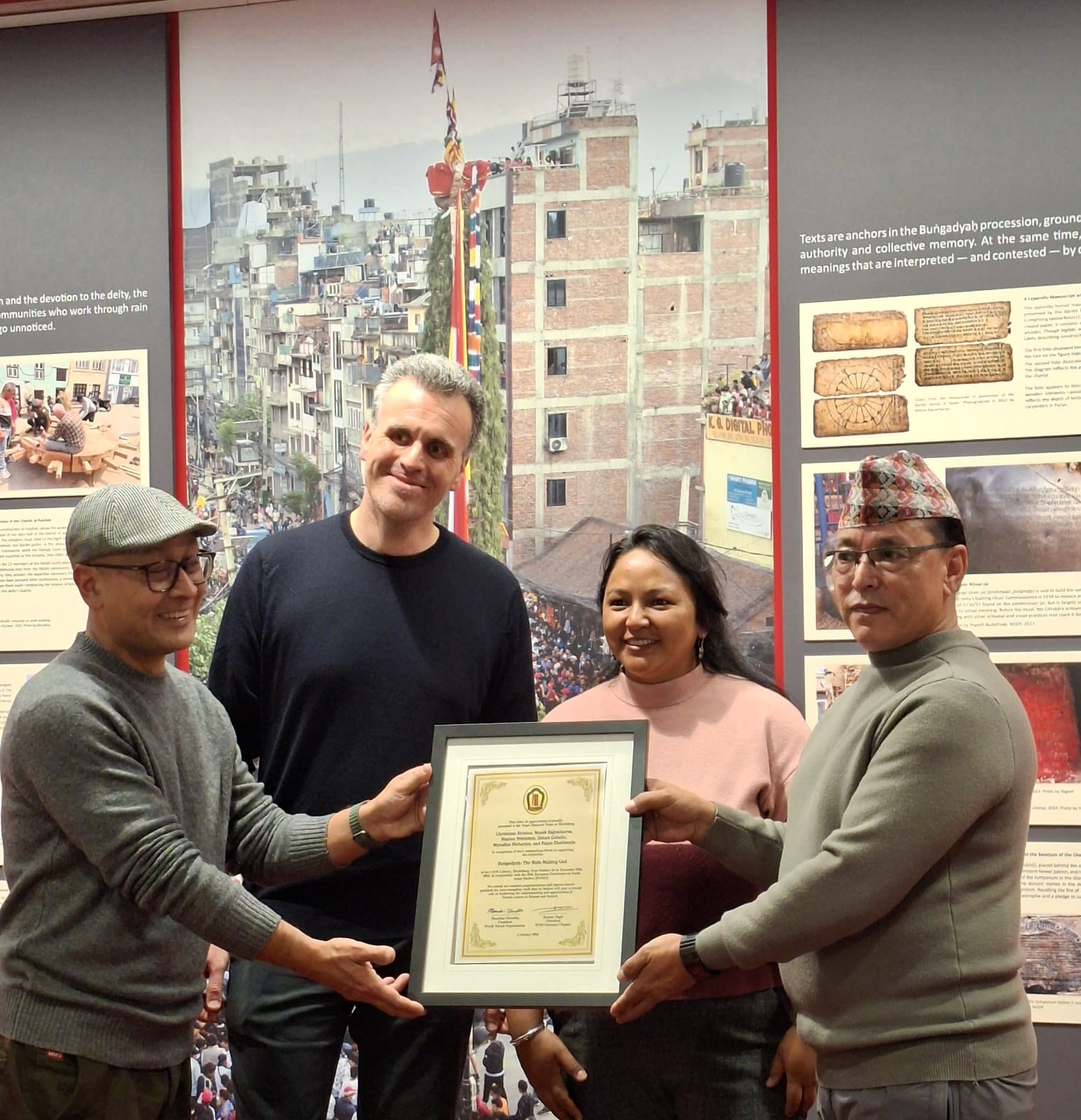
Beiträge auf der European Conference for South Asian Studies, Heidelberg
Die 28. Europäische Konferenz für Südasienstudien (ECSAS) fand vom 1. bis 4. Oktober 2025 in Heidelberg statt. Mitarbeitende der Forschungsstelle trugen dazu mit einem Panel und Vorträgen bei. Manik Bajracharya, Nirajan Kafle und Rajan Khatiwoda leiteten das Panel "Hinduisation and Sanskritisation in the Himalayas," das Vorträge von Alessandro Giudice, Arik Moran, Astrid Zotter, Devaki Sapkota, Pradip Ghimire, Nirajan Kafle, Manik Bajracharya & Rajan Khatiwoda und Monalisa Maharjan umfasste.
Darüber hinaus präsentierten Christof Zotter und Julia Shrestha Beiträge in anderen Panels. Für ihr Paper ("Mundhumi Natak – The Limbu Oral Tradition in Contemporary Nepali Theatre") erhielt Julia Shrestha den diesjährigen EASAS Research Student Award, der an herausragende Doktoranden-Paper der Konferenz verliehen wurde.
Die Forschungsstelle präsentierte außerdem ihre Publikationen an einem Bücherstand auf der Konferenz.
Vorträge auf der Newah Academic Conference on Culture and Heritage, SOAS University of London
Am 13. September, 2025, präsentierten Shobhit Shakya, Manik Bajracharya und Rajan Khatiwoda auf der Newah Academic Conference on Culture and Heritage (NACCH) an der SOAS University of London. Ihre Vorträge trugen die Titel "Newars and Their Heritage: From Heritage Mentality to Ecological Approach to Heritage?" (Shakya) und "Challenges and Opportunities in Documenting the Tangible and Intangible Heritage of the Kathmandu Valley" (Bajracharya und Khatiwoda).
Willkommen Dr. Shobhit Shakya
Die Forschungsstelle begrüßt Dr. Shobhit Shakya als neuen Mitarbeiter, der im Rahmen der Forschungsstelle ein Post-Doc Projekt zu traditionellen Institutionen in Nepal, ihrer Rolle in der historischen Verwaltung und ihrer Entwicklung im Laufe der Geschichte verfolgt. Shobhit hat einen PhD in Verwaltungswissenschaften vom Ragnar Nurkse Department of Innovation and Governance der Technischen Universität Tallinn in Estland. Seine Forschung konzentriert sich auf Perspektiven aus Nicht-Westlicher Governance, insbesondere mit Schwerpunkt auf der Himalaya-Region, und untersucht Themen wie buddhistische Governance-Prinzipien, Digitalität und gesellschaftliches Engagement. Er hat sich intensiv mit der Guthi-Institution in Nepal aus der Perspektive der lokalen Governance befasst. Shobhit ist außerdem Honorary Research Fellow am Institute for Innovation and Public Purpose am University College London, UK, und Chefredakteur der Zeitschrift Halduskultuur – The Estonian Journal of Administrative Culture and Digital Governance.

Beiträge auf dem 14. International Indology Graduate Research Symposium, Toyo University, Japan
Am 7. Dezember 2024 präsentierten Marija Grujovska und Julia Shrestha ihre Forschungsergebnisse zu Dokumenten aus dem Korpus der Documenta Nepalica auf dem 14. International Indology Graduate Research Symposium (IIGRS) an der Toyo University in Tokio, Japan. Ihre Vorträge trugen die Titel: „The Daily and Occasional Worship Trust of Tripureśvara Temple“ (Marija Grujovska) und "'May We Obtain nagarās?'—Insights into the Socio-Political Roles of nagarā Kettledrums among the Limbu Indigenous Group from 19th-Century Nepalese Documents" (Julia Shrestha).
Buchpräsentation: Homicide Law in 19th-Century Nepal von Dr. Rajan Khatiwoda, Kathmandu
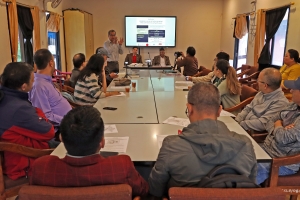

Am 10. November 2024 präsentierte Dr. Rajan Khatiwoda sein Buch Homicide Law in 19th-Century Nepal: A Study of the Muluki Ains and Legal Documents (Heidelberg University Publishing, Documenta Nepalica: Book Series, Band 7, 2024) im Martin Chautari Institut in Kathmandu. Anlass war die Veröffentlichung der südasiatischen Ausgabe des Buches durch Vajra Books. Diese Ausgabe soll das Werk einem größeren Publikum in Nepal und Südasien zugänglich machen.
Prof. Triratna Manandhar von der Tribhuvan University (Kathmandu) und Shubhanga Pandey, Doktorand an der University of California (Los Angeles) bereicherten die Veranstaltung mit ihren Beiträgen. https://vajrabookshop.com/product/homicide-law-in-19th-century-nepal-a-study-of-the-muluki-ains-and-legal-documents/
Gemeinsames Vortragsprogramm, Yala Maya Kendra, Patan
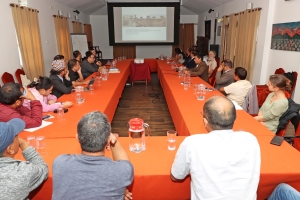
Am 21. Oktober 2024 veranstaltete die Forschungsabteilung in Zusammenarbeit mit dem Martin Chautari Institute, dem South Asia Institute Kathmandu Branch und dem Nepal Heritage Documentation Project ein gemeinsames Vortragsprogramm, um laufende Forschungsprojekte und Infrastrukturen zu diskutieren und auszutauschen. Das Programm fand im Yala Maya Kendra in Patan, Nepal, statt und beinhaltete eine von Dr. Manik Bajracharya geleitete Sitzung mit dem Titel „Documenta Nepalica: Eine digitale Forschungsumgebung für das Studium historischer Dokumente Nepals“, in der Dr. Bajracharya die digitale Infrastruktur der Forschungseinheit und ihre Anwendungen für das Studium der historischen Dokumente Nepals vorstellte. Dr. Rajan Khatiwoda referierte über: Digitale Bewahrung von materiellem und immateriellem Kulturerbe im Kathmandutal. Pratyoush Onta und Devendra Uprety hielten einen Vortrag über: Geschichte der öffentlichen Schulbildung in Nepal während des langen 20. Jahrhunderts: Nicht-staatszentrierte Perspektiven und Beispiele.
Buchpräsentation: The Mulukī Ain of 1854 – Nepal's First Legal Code, Kathmandu
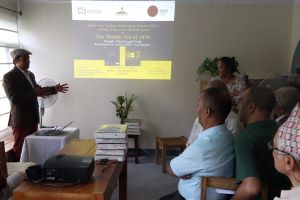
Am 16. August 2024 wurde The Mulukī Ain of 1854 – Nepal's First Legal Code von Simon Cubelic, Rajan Khatiwoda und Axel Michaels im Rahmen einer Veranstaltung der Außenstelle des Südasieninstituts der Universität Heidelberg in Kathmandu vorgestellt. Ursprünglich 2021 bei Heidelberg University Publishing als Teil der Documenta Nepalica Buchreihe erschienen, wurde das Buch nun von Vajra Publications neu aufgelegt, um es einem breiteren Publikum in Nepal und Südasien zugänglich zu machen.
Die Veranstaltung begann mit der Präsentation des Buches durch Dr. Rajan Khatiwoda, gefolgt von einem Kommentar von Prof. Prayag Raj Sharma und einer anregenden Diskussion der Teilnehmer. https://kathmandupost.com/books/2024/07/27/english-translation-of-muluki-ain-1854-published
Prof. Axel Michaels' neue Buchpublikation
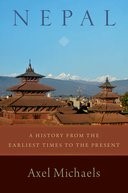
Am 20. Juli 2024 veröffentlichte Prof. Axel Michaels’ Nepal: A History from the Earliest Times to the Present (Oxford University Press, 2024).
Dieses Buch zeichnet die Geschichte der kulturellen, religiösen und soziopolitischen Vielfalt Nepals als Binnenstaat zwischen Indien und China (Tibet) nach – einem Land mit 125 anerkannten ethnischen Gruppen, 123 Sprachen sowie einer Fülle an Religionen, textuellen und kunsthistorischen Traditionen und unterschiedlichen politischen Machtzentren.
Im Fokus steht eine transkulturelle Geschichte der Region, die unterschiedliche politische Ansprüche und Organisationsformen, multiple und fließende Identitäten sowie grenzüberschreitende transkulturelle, transreligiöse und wirtschaftliche Verflechtungen berücksichtigt.
Wie ein roter Faden zieht sich dabei die Frage durch das Buch, wie die großen Herausforderungen des Landes in Bezug auf soziale Konflikte, Nationalisierung, Infrastruktur, Bildung, Migration, geteilte Herrschaftsformen und politische Instabilität bewältigt werden können, ohne die beeindruckende ethnische und kulturelle Vielfalt zu gefährden.
Michaels, Axel. 2024. Nepal: A History from the Earliest Times to the Present. New York: Oxford University Press https://academic.oup.com/book/56088
Beiträge auf dem 3. Deutschen Südasientag in Leipzig
Am 29. Juni 2024 hielten Marija Grujovska und Julia Shrestha Vorträge im Rahmen des 3. Deutschen Südasientags (28.-29. Juni) an der Universität Leipzig. Ihre Vorträge trugen die Titel „Royal Land Endowments in 19th-Century Nepal“ (Marija Grujovska) und „The Yuma Mundhum: An Oral Text about the Limbu Grandmother Goddess from Eastern Nepal“ (Julia Shrestha).
Willkommen Julia Shrestha

Die Forschungsstelle heißt Julia Shrestha als neue wissenschaftliche Mitarbeiterin herzlich willkommen. Julia hat einen Master in Südasienwissenschaften mit Schwerpunkt Anthropologie von der Universität Heidelberg. Sie arbeitet an ihrem Doktorat an der Universität Wien zum Thema des Yuma Mundhum – eine ethnografische Studie der mündlichen Texttraditionen über die Limbu Großmuttergottheit Yuma. Ihre Forschungsinteressen liegen in der Anthropologie schriftlicher und mündlicher Texte, Religion und Ritual und in kritischen Studien zur Ethnizität im Kontext von Nepal. In der Forschungsstelle ediert sie Dokumente zur Geschichte Ostnepals und Dokumente, die die Konstruktion von Ethnizität und die Beziehungen zwischen der lokalen Bevölkerung und dem Staat beleuchten.
Verabschiedung Dr. Simon Cubelic

Die Forschungsstelle verabschiedet sich herzlich von Dr. Simon Cubelic, der im Juni 2024 zum stellvertretenden Leiter der Südasien-Abteilung der Bibliothek des Centre for Asian and Transcultural Studies (CATS) ernannt wurde. Simon Cubelic war seit der Gründung der Forschungsstelle im Jahr 2014 als wissenschaftlicher Mitarbeiter unser geschätzter Kollege. Darüber hinaus war er seit 2020 als wissenschaftlicher Bibliothekar in der CATS-Bibliothek tätig. Auch in seiner neuen Rolle wird Simon der Forschungsstelle weiterhin als assoziiertes Mitglied verbunden bleiben. Wir danken Simon herzlich für seine langjährige Mitarbeit, gratulieren zu seiner neuen Stelle und wünschen ihm alles Gute für seine berufliche Zukunft.
Konferenz: ‘A Yam between Two Rocks’: Transcultural Histories of Nepal’s Relations with India, China, and Tibet.
Am 27. und 28. Mai 2024 organisierte die Forschungsstelle gemeinsam mit dem Nepal Heritage Documentation Project (Heidelberger Zentrum für Transkulturelle Studien, Heidelberger Akademie der Wissenschaften) eine Konferenz, die die transkulturellen Beziehungen Nepals zu seinen Nachbarn Indien, China und Tibet, untersuchte und gleichzeitig Axel Michaels anlässlich seines 75. Geburtstags ehrte. Mit der Thematik der Transkulturalität im nepalesischen Kontext beleuchtete die Konferenz ein zentrales Thema in Prof. Michaels’ wissenschaftlichem Werk.
Vier Panels versammelten Beiträge zu Themen, die historische und zeitgenössische transregionale Beziehungen und Dynamiken, globale Verflechtungen sowie Grenzüberschreitungen in den Bereichen der materiellen Kultur, der Religion und der sozialen Beziehungen, betrachteten. Die Keynote „A yam or a sausage? Elastic boundaries, internal exotica, and other features in the slow coagulation of a nation,“ von Prof. Charles Ramble, hinterfragte König Pṛthvīnārāyaṇa Śāhas Bild von Nepal als „Yamswurzel zwischen zwei Felsen“ kritisch und stellte diesem provokativ die Wurst als eine alternative Metapher für Nepals Nationenwerdung entgegen.
Den Abschluss der Konferenz bildete die Präsentation von Prof. Michaels' neu erschienenem Buch „Nepal: A History from the Earliest Times to the Present“ (Oxford University Press, 2024), das von Prof. David Gellner vorgestellt wurde.
[Clink here for the program brochure]
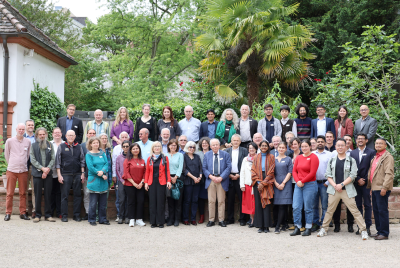 FSNepal
|
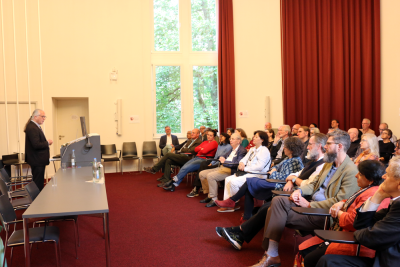 FSNepal
|
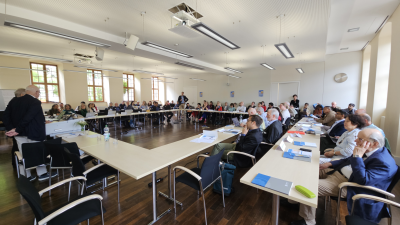 FSNepal
|
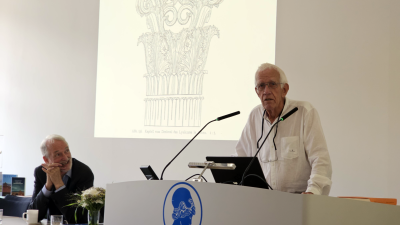 FSNepal
|
Neuer Band in der Reihe "Documenta Nepalica"
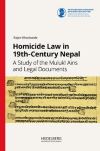
DOCUMENTA NEPALICA VOL. 7
Khatiwoda, Rajan. Homicide Law in 19th-Century Nepal: A Study of the Mulukī Ains and Legal Documents. Heidelberg: Heidelberg University Publishing, 2024 (Documenta Nepalica: Book Series, Vol. 7). https://doi.org/10.17885/heiup.1276
Vortrag von Dr. Manik Bajracharya, University of California, Berkeley
Am 9. März 2024 hielt Dr. Manik Bajracharya einen Vortrag im Rahmen einer Konferenz zur Entstehung und Formierung des Newar-Buddhismus an der University of California, Berkeley. Der Titel seines Vortrags lautete: „Royal Patronage of the Cult of Bungama-Lokeshvara under King Srinivasa Malla “.
Am 10. März 2024 hielt Dr. Bajracharya während derselben Konferenz einen Workshop über die digitalen Infrastrukturen der Documenta Nepalica und des NHDP.
Vortrag von Dr. Manik Bajracharya, Universität Bonn
Am 19. Februar 2024 hielt Dr. Manik Bajracharya einen Vortrag im Rahmen der Joseph C. Miller Memorial Lecture Series am Bonn Center for Dependency and Slavery Studies der Universität Bonn. Der Titel seines Vortrags lautete: „Slavery in the Eighteenth and Nineteenth Century Nepal “.
Der Vortrag befasste sich mit der Sklaverei und anderen Formen der unfreien Arbeit im 18. und 19. Jahrhundert in Nepal und betrachtete deren Typologie, die Rolle der Sklaven in der sozialen Ordnung und die Prozesse der Versklavung und Emanzipation.
Vortrag von Prof. Axel Michaels, Völkerkundemuseum, Heidelberg
Am 9. Februar 2024 hielt Prof. Axel Michaels im Heidelberger Völkerkundemuseum einen Vortrag zum Thema „Die Kriege zwischen Nepal und China/Tibet: Wer hat sie gewonnen?“
Prof. Michaels entwirrte in seinem Vortrag das komplizierte Geflecht politischer Dynamiken und Wendungen der Kriege, um deren unerwartetes Ende im paradoxen Anspruch beider Seiten auf einen Sieg zu beleuchten.
Forschungsstelle auf dem Akademientag 2023
Auf dem Akademientag, der am 7. November 2023 stattfand und sich dem Thema "Was ist gerecht? – Gerechtigkeitsvorstellungen im globalen Vergleich" widmete, war die Forschungsstelle mit einem Stand zur Geschichte von Sklaverei und Kastensystem in Nepal vertreten. Weitere Informationen zu der Veranstaltung finden Sie hier.
Neuer Band in der Reihe "Documenta Nepalica"
Documenta Nepalica Vol. 4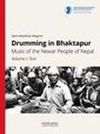 heiUP
Wegner, Gert-Matthias, Drumming in Bhaktapur: Music of the Newar People of Nepal, Volume I: Text, Volume II: Transcriptions, Heidelberg: Heidelberg University Publishing, 2023 (Documenta Nepalica – Book Series, Vol. 4), DOI: https://doi.org/10.17885/heiup.1246.
|
Konservierung von Palmblatt-Urkunden
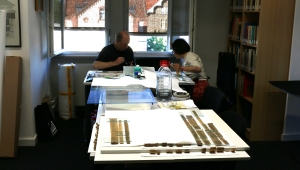
Im Rahmen des Projekts "Postkoloniale Restitution im digitalen Zeitalter: Das Archivieren und Kontextualisieren einer privaten Sammlung nepalesischer Manuskripte" besuchten im September 2023 die Restauratoren Mark Barnard und Kumiko Matsuoka die Forschungsstelle, um an der Erhaltung mittelalterlicher Palmblattrollen aus einer privaten Sammlung zu arbeiten. Im Jahr zuvor waren Kumiko Matsuoka und Naoko Takagi für eine Pilotstudie nach Heidelberg gekommen. In beiden Aufenthalten konnten insgesamt 465 Palmblattrollen geöffnet, gescannt und konserviert werden.
Panel bei der ECSAS 2023 in Turin
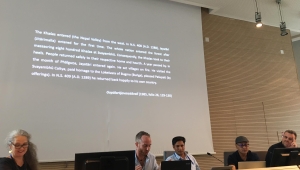
Mitglieder der Forschungsstelle organisierten gemeinsam mit dem Nepal Heritage Documentation Project das Panel "Stasis and Motion in the Processional Culture of Kathmandu Valley: The Buṅgadyaḥ Yātrā Revisited" bei der 27. European Conference for South Asian Studies (ECSAS) im Juli 2023 in Turin. Das Panel, das von Manik Bajracharya, Christiane Brosius und Rajan Khatiwoda geleitet wurde, umfasste Beiträge von David Andolfatto, Simon Cubelic und Rajan Khatiwoda, Manik Bajracharya, Bruce Owens, Christiane Brosius sowie Monalisa Maharjan und Bibek Basukala.
Astrid Zotter tritt Stelle an der Universität Heidelberg an

Dr. Astrid Zotter wechselt zum 1. April 2023 auf eine Dauerstelle als wissenschaftliche Mitarbeiterin an die Abteilung "Kultur- und Religionsgeschichte Südasiens" des Südasien-Instituts der Universität Heidelberg. Wir danken Astrid herzlich für ihren langjährigen, unermüdlichen Einsatz als stellvertretende Forschungsstellenleiterin und wünschen ihr für ihre berufliche Zukunft alles Gute.
Panel auf dem Deutschen Orientalistentag 2022
Die Projektmitarbeiter Simon Cubelic und Astrid Zotter organisierten zusammen mit Nina Mirnig (Österreichische Akademie der Wissenschaften) das Panel "Inscriptions as Social Artefacts: Revisiting South Asian Epigraphic Cultures" auf dem 34. Deutschen Orientalistentag (12.-17. September 2022) an der Freien Universität Berlin. Das Panel untersuchte die vielfältigen Funktionen, die Inschriften bei der Konstruktion von Räumen, sozialen Identitäten und politischer Autorität in Südasien spielten. Die Beiträger des Panels waren Diwakar Acharya, Georg Berkemer, Simon Cubelic, Valerie Gillet, Timothy Lubin, Nina Mirnig und Ingo Strauch.
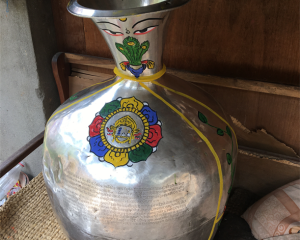
Zusätzlich hielten Simon Cubelic und Astrid Zotter eine gemeinsame Präsentation über die Beziehung zwischen Staat und Stiftungen im 19. Jahrhundert in Nepal im Rahmen des Panels "Stiften durch die Jahrtausende", das von Prof. Joachim Friedrich Quack organisiert wurde.
Neues Kooperationsprojekt "Modellierung von Texteditionen als Linked Data (edition2LD)"
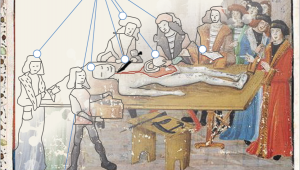
Das Vorhaben "Modellierung von Texteditionen als Linked Data (edition2LD)" der Heidelberger Akademie der Wissenschaften unter der Leitung von Dieta Svoboda-Baas und Sabine Tittel wird im Rahmen des NFDI Verbundes Text+ gefördert. Das Projekt zielt darauf ab, anhand bestehender Projektdaten der Forschungsstelle "Religions- und rechtsgeschichtliche Quellen des vormodernen Nepal" einen Workflow zu erarbeiten, der mit maximal automatisierten Prozessen Editionen in Form von RDF-Tripeln abbildet und auf andere Projekte übertragen werden kann.
Die Forschungsstelle begrüßt Marija Grujovska als neue Mitarbeiterin

Die Forschungsstelle begrüßt Marija Grujovska als neue Mitarbeiterin, die im Rahmen des Projekts ihr Promotionsvorhaben verfolgen wird. Marija absolvierte ein BA-Studium in Ethnologie an der Universität Wien sowie ein MA-Studium in Kultur- und Religionsgeschichte Südasiens an der Universität Heidelberg. In ihrem Dissertationsprojekt untersucht Marija die Verwaltungsgeschichte des Tripureśvara Mahādeva Tempels in Kathmandu von seiner Gründung im frühen 19. Jahrhundert bis in die Gegenwart, wobei sie Methoden der Archiv- und Feldforschung miteinander verbindet.
Video-Portrait der Forschungsstelle online
Ein Kurzportrait der Forschungsstelle auf dem Youtube-Kanal der Heidelberger Akademie der Wissenschaften ist hier verfügbar.

Neue Publikationen in der Reihe "Documenta Nepalica"
Documenta Nepalica Band 3Bajracharya, Manik (Hrsg.), Slavery and Unfree Labour in Nepal: Documents from the 18th to Early 20th Century, Heidelberg: Heidelberg University Publishing, 2022 (Documenta Nepalica – Book Series, Vol. 3), DOI: 10.17885/heiup.1003. |
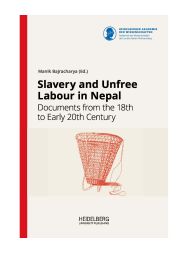 HAdW
|
Documenta Nepalica Band 5Bijay Basukala, Niels Gutschow, Nutandhar Sharma, Patan-Vãbāhā : History and Inventory of a Newar Buddhist Monastery, Heidelberg: Heidelberg University Publishing, 2022 (Documenta Nepalica – Book Series, Band 5), DOI: 10.17885/heiup.1116. |
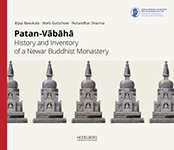 HAdW
|
Nepal-Tag an der Universität Heidelberg
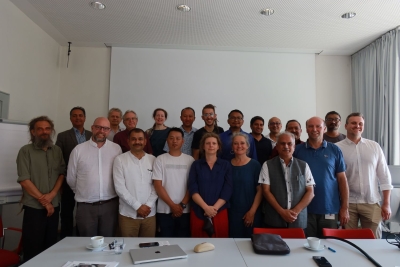
Das Südasien-Institut (SAI) veranstaltete am 21. und 22. Juli 2022 einen Nepal-Tag, um das 35-jährige Jubiläum der Außenstelle des SAI in Nepal sowie das 60-jährige Jubiläum des SAI zu feiern.
Die Veranstaltung begann mit der Unterzeichnung eines Memorandum of Understanding zwischen der Universität Heidelberg und der Tribhuvan-Universität vertreten durch die jeweiligen Rektoren Prof. Bernhard Eitel und Prof. Shiva Lal Bhusal. Daran schloss sich Begrüßungsansprachen von Prof. Rahul Mukherji, Direktor des SAI, Rektor Prof. Bhusal und Prof. Christiane Brosius an. Im Rahmen der Podiumsdiskussion "Was haben wir aus Nepal gelernt?" reflektierten Prof. Niels Gutschow und Prof. Axel Michaels über ihre langjährige Forschungstätigkeit in Nepal.
Der Nepal-Tag bot auch die Möglichkeit, laufende Forschungsvorhaben vorzustellen. Dazu gehörten das Nepal Heritage Documentation Project (präsentiert von Rajan Khatiwoda und Bharat Maharjan), die Forschungsstelle „Religions- und rechtsgeschichtliche Quellen des vormodernen Nepal“ der Heidelberger Akademie der Wissenschaften (präsentiert von Dr. Manik Bajracharya und Dr. Astrid Zotter), „Urban Transformation and Placemaking“ (präsentiert von Prof. Christiane Brosius und Sujan Chitrakar) und „Himalyan Socio-Hydrology: Evidence from Nepal“ (präsentiert von Prof. Marcus Nüsser und Dr. Susanne Schmidt).
Darauf folgten Vorträge von Prof. Sagar Raj Sharma (Kathmandu University) mit dem Titel "Dilemmas of a Nation in Transition", der sich mit den sozioökonomischen und ökologischen Herausforderungen Nepals befasste, sowie von Prof. Martin Gaenszle (Universität Wien) zu "Ethnic Traditions and Global Archives: Changing Research Conditions in Nepal". Der Vortrag von Prof. Gaenszle stellte die Potenziale digitaler Archivierungsmethoden für die ethnographische Dokumentation heraus und reflektierte über die damit verbundenen Herausforderungen.
Am 22. Juli moderierte Prof. Brosius ein Round-Table-Gespräch über die zukünftige Zusammenarbeit zwischen der Universität Heidelberg, der Tribhuvan-Universität und der Kathmandu University.
Tagung "Studies on Dharma in the Himalayan Region" in Neapel
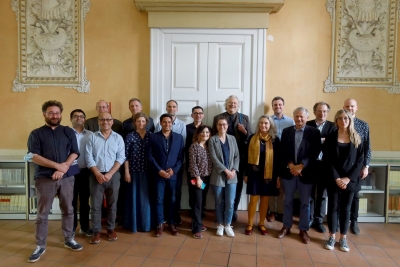
Die Forschungsstelle organisierte zusammen mit dem ERC-Projekt "Translocal Identities: The Śivadharma and the Making of Regional Religious Traditions in Premodern South Asia" und dem Institut für Asienwissenschaften der Universität Turin vom 27. bis 28. April 2022 eine zweitägige Konferenz mit dem Titel "Studies on Dharma in the Himalayan Region" an der Universität Neapel L’Orientale. Manik Bajracharya und Rajan Khatiwoda untersuchten in ihrem Beitrag das Konzept der Sklaverei im ersten nepalesischen Gesetzbuch (Ain) von 1854 im Vergleich zu den hinduistischen Rechtsschriften, den Dharmaśāstras. Simon Cubelic stellte den Zusammenhang von Kastensystem und Tribut im Ain von 1854 heraus. Axel Michaels' Beitrag konzentrierte sich auf die Manipulation der Prinzipien des Dharmaśāstra durch König Raṇa Bahādura Śāha (r. 1777—99) zur Rechtfertigung seiner illegitimen Handlungen. Ramhari Timalsina hob das Fortwirken der Dharmaśāstras in nepalischen Rechtszeugnissen des 18. bis 19. Jahrhunderts hervor. Astrid Zotter sprach über die Gattung der Dharma-Nibandhas im spätmittelalterlichen und frühneuzeitlichen Nepal.
Nepal als ein Schwerpunkt der Heidelberger Asienforschung
Südasien-Institut der Universität Heidelberg unterhält seit 35 Jahren eine Außenstelle in Kathmandu.
Wie der Geschäftsführende Direktor des Südasien-Instituts, Prof. Dr. Rahul Mukherji, betont, ist Nepal zu einem Schwerpunkt der Asienforschung an der Universität Heidelberg geworden. "Weltweit gibt es keine derartige Konzentration an disziplinären und regionalspezifischen Kompetenzen, Forschungen und Projekten."
Weitere Informationen finden Sie hier
Neue Publikation
|
Ute Hüsken, Vasudha Narayanan, Astrid Zotter (Hrsg.), Nine Nights of Power. Durgā, Dolls, and Darbārs, SUNY series in Hindu Studies, 2021, ISBN13: 978-1-4384-8407-5 (erhältlich als Hardcover, Google eBook und Kindle Edition, s. hier). |
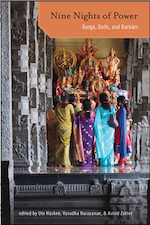 SUNY Press
|
Neuer band in der Reihe "Documenta Nepalica"
Documenta Nepalica Band 2Rajan Khatowoda, Simon Cubelic, Axel Michaels (Hrsg.), The Mulukī Ain of 1854. Nepal's First Legal Code, Heidelberg: Heidelberg University Publishing, 2021 (Documenta Nepalica – Book Series, Band 2), DOI: 10.17885/heiup.769. |
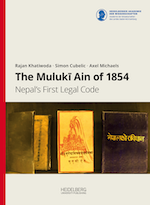 HAdW
|
Konferenz "Workshop on Resources and Technologies for Indigenous, Endangered and Lesser-resourced Languages in Eurasia (EURALI)"
Im Rahmen der LREC 2022 fand am 20.06.2022 in Marseille der "Workshop on Resources and Technologies for Indigenous, Endangered and Lesser-resourced Languages in Eurasia (EURALI)" statt. Sabine Tittel stellte dort in Form eines Posters und Vortrags, "Towards an Ontology for Toponyms in Nepalese Historical Documents", Arbeiten an einer Ortsnamenontologie zu den Documenta Nepalica vor.
Vortragsreihe
Im Rahmen der Vortragsreihe "Asian Religions and the Politics of Heritage", veranstaltet vom Südasien-Institut & Heidelberg Centre for Transcultural Studies (Website der Veranstaltungsreihe: https://www.sai.uni-heidelberg.de/abt/IND/en/index.php), fanden im Juni und Juli die folgenden Vorträge statt:
"Heritage Politics at the Paśupatinātha Temple in Nepal",
Prof. Dr. Axel Michaels,
Donnerstag, 24. Juni 2021, 11:15 Uhr, siehe hier.
"Places of Value: Inscriptions as Valorisation Practices at Cultural Heritage Sites in Kathmandu Valley",
Dr. Simon Cubelic,
Donnerstag, 08. Juli 2021, 11:15 Uhr, siehe hier.
Integration der ersten 137 Inschriften aus DANAM in die Documenta Nepalica
Im Rahmen des Pilotprojekts "Anthropologie der Inschriften: Memory and Cultural Heritage in the Public Sphere" (HCTS/Flagship Initiative "Transforming Cultural Heritage") wurden die ersten Katalogeinträge von Inschriften aus dem Digital Archive of Nepalese Arts and Monuments (DANAM) erfolgreich in die Datenbank der Documenta Nepalica integriert. Der Datensatz mit 137 Inschriften von rund 60 Monumenten (markiert mit der Kennung "NHDP") kann nun innerhalb des Katalogs der Documenta Nepalica, der mehr als 60.000 Einträge aus öffentlichen und privaten Archiven Nepals enthält, recherchiert werden. Zukünftig werden regelmäßig neue Einträge des Inschriftenkatalogs von DANAM in die Datenbank überspielt. Der Transfer ist Teil der Bestrebungen, die Datenbanken beider Projekte miteinander zu verknüpfen und ermöglicht weiterführende, interdisziplinäre Untersuchungen zu Nepals textlichem, kunsthistorischem und immateriellem Kulturerbe. Die Katalogsuche der Documenta Nepalica kann hier aufgerufen werden.
Symposium "The Digital Preservation of Asian Manuscripts and Documents" (26. Februar 2021)
Am 26. Februar 2021, 10:00 - 12:00 CET, fand das virtuelle, internationale Symposium "The Digital Preservation of Asian Manuscripts and Documents" statt. Das Symposium wurde in Zusammenarbeit mit der Abteilung "Digital Archiving and Research" der Otani University, Kyoto, durchgeführt. Das Programm finden Sie über den unten stehenden Link.

